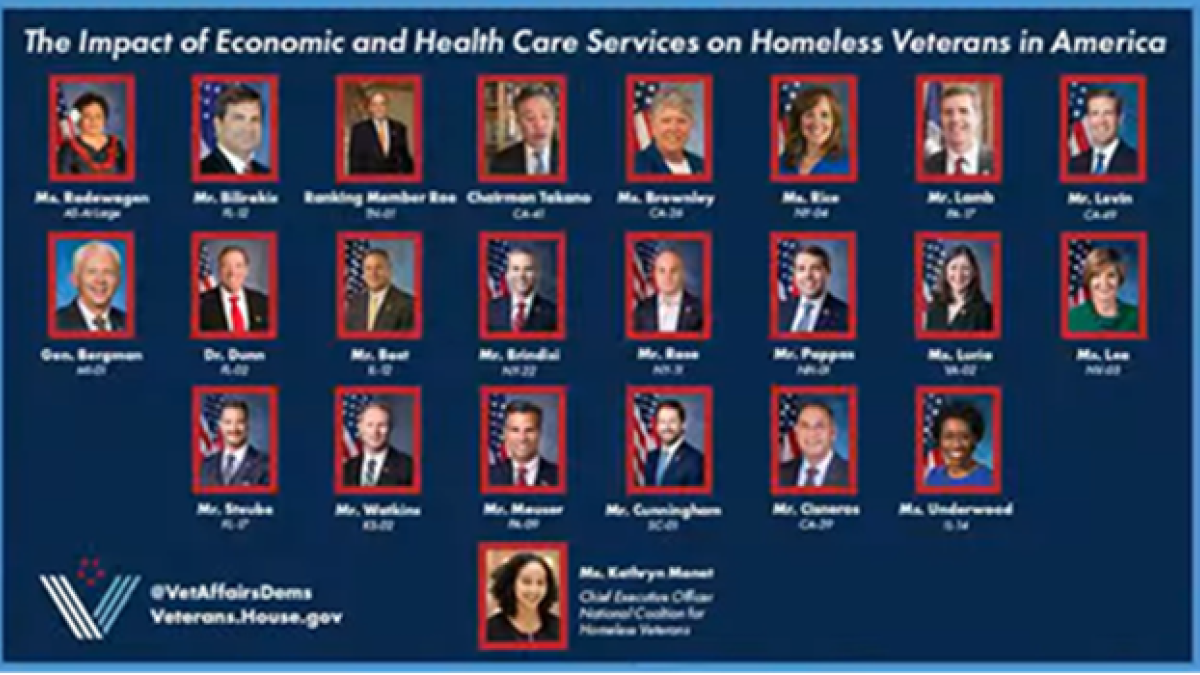***VIDEO FILE INCLUDED*** Rep. Lee Highlights Needs for Homeless Veterans in House Veterans’ Affairs Committee COVID-19 Virtual Hearing

CLICK HERE TO DOWNLOAD VIDEO FILE
Washington, D.C. — U.S. Rep. Susie Lee (Nev.-03) participated in a House Veterans' Affairs Committee (HVAC) virtual forum, discussing the impact of the COVID-19 pandemic on economic and health care services for homeless veterans. This was the first live, public, and entirely virtual bipartisan congressional forum ever conducted.
Ms. Kathryn Monet, Chief Executive Officer of National Coalition for Homeless Veterans, was the sole witness for the hearing.
Rep. Lee highlighted the Las Vegas chapter of U.S. VETS, a non-profit organization that provides housing and job assistance to veterans. She discussed their struggles to serve the increased number of veterans who have been displaced by the pandemic, while also keeping up with increased operating costs. Rep. Lee asked Ms. Monet how she thinks Congress can help these groups:
Rep. Lee - "U.S. VETS operates over 330 beds in transitional and permanent housing. They have been forced to lock down their facilities and therefore have seen a significant increase in their operating costs. Before, they served 80-100 meals per day, now they're at over 150. They have purchased activity kits and PPE to help veterans during lockdown. While their organization is lucky because they've received donations for other items such as toilet paper, other organizations have not been as lucky. Can you talk about ways Congress can help to offset some of these unexpected operating costs and what you're looking for in CARES 2.0?"
Ms. Monet highlighted two priorities for providers that she believes Congress should support: increased funding for the Grant and Per Diem Program, and allowing organizations to purchase personal protective equipment (PPE) from the Department of Veterans Affairs (VA) at-cost.
Ms. Monet - "I think you're spot on, there are a lot of smaller providers like U.S. VETS...there are a lot of smaller mom and pop providers who are really struggling. There are other providers who have also locked down their facilities, and have now been unable to accept—you know—meal donations where they would normally ask corporations to come in to provide breakfast daily, or lunch daily. They aren't really doing that. They are seeing these really huge costs in unexpected ways that haven't been budgeted for because who could have really planned for a pandemic like this? So, to the extent that [Congress] could work something out for the Grant and Per Diem Program. That is incredibly important.
"One of the other things we asked for...if providers could purchase PPE from VA at-cost, that would be a significant savings for them. Right now, they're out on the private market, competing with everyone else looking at totally inflated prices, or potentially they're out in their community trying to buy it at their local grocery store, competing against their neighbors trying to buy two gallons of bleach. I do think more attention in that area would be incredibly helpful."
BACKGROUND: Homelessness and housing programs for the homeless veteran population received $300 billion in funding from the bipartisan Coronavirus Aid, Relief, and Economic Security (CARES) Act.
The CARES Act also gave the Department of Veterans Affairs (VA) the authority to provide telecommunication equipment to case managers and participants in the HUD-VASH program and remove statutory limitations on funding for the Supportive Services for Veteran Families (SSVF) and the Grant Per Diem (GPD) rate. Unfortunately, the CARES Act did not provide VA homeless programs with all the waivers and authorities that it needs during COVID-19 pandemic.
###